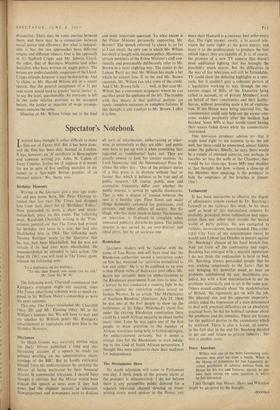Disclosure Sir Hugh Greene was naturally nettled when the Daily
Mirror published a long and em- barrassing account of a speech he made (in private) dwelling on the administrative short- comings of the BBC. But he hardly extricated himself from his embarrassment by accusing the Mirror of being motivated by their financial Interest in commercial television. I should have thought it obvious that the Mirror would have treated this speech as news even if they had never had the slightest interest in television. Newspapermen and newspapers exist to disclose all sorts of information, embarrassing or other- wise, as extensively as they are able: and public men have to put up with it when something they regarded as 'confidential' leaks out. They are usually unwise to look for sinister motives. As Lord Shawcross told the International Press In- stitute the other day: 'One of the primary duties of a free press is to disclose without fear or favour that which it believes to be true and of public concern.' Of course, public men and journalists frequently differ over whether the public interest is served by specific disclosures. That is why a degree of tension between the two is a healthy sign. Fleet Street can make things damnably awkward for politicians, civil servants, and other pillars of society. But Sir Hugh, who has done much to foster 'fearlessness' on television, is ill-placed to complain when unwanted publicity disturbs his peace. The public interest is not served by an over-discreet and timid press, but by an accurate one.


































 Previous page
Previous page